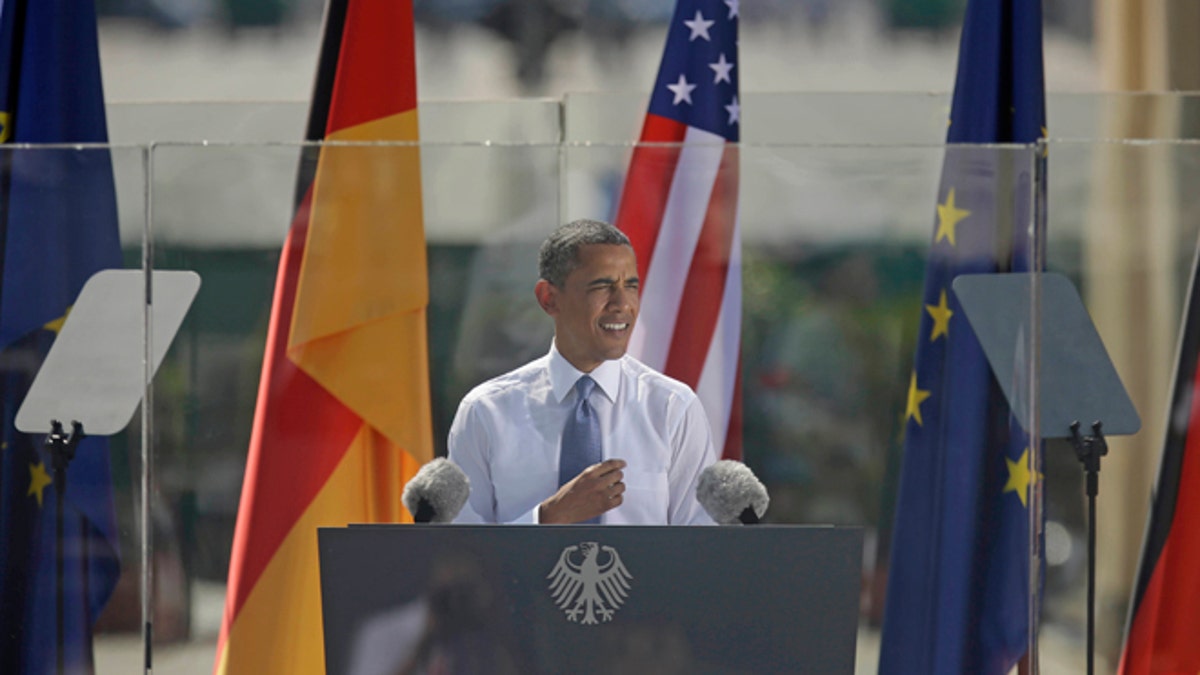
June 19, 2013: President Obama speaks in front of the iconic Brandenburg Gate in Berlin, Germany. (AP)
When Hollywood celebrities “Demand Zero,” President Obama applauds. Thursday in Berlin, he announced his intent to march further along “The Road to Zero”—toward a world without nuclear weapons.
Movie stars aren’t expected to understand the intricacies of nuclear weapons policy, but the commander-in-chief should know better than to follow this path.
For decades, nuclear weapons have played a critical role in U.S. security, deterring potential aggressors from attacking our homeland and troops deployed abroad. Our allies have relied on has U.S. nuclear umbrella, as well. It’s been so effective—and so reliable—most of our allies have foregone developing nuclear weapons of their own.
[pullquote]
While “Demand Zero” may sound great on red carpets in Hollywood and Manhattan, it sure doesn’t ring true in Tokyo and Seoul. People living there know they face a real threat: nuclear-armed North Korea.
Pyongyang has repeatedly threatened to turn South Korea – and the United States – to “a sea of fire.” Kim Jong Eun already has ballistic missiles that can reach Japan and U.S. troops deployed throughout the region. The need for deterrence remains.
But President Obama has been hitting the Road to Zero for years.
In February 2011, his negotiating team signed off on the New START—a treaty with Russia that limits each nation to no more than 1,550 strategic nuclear warheads.
For the U.S., that means reducing our nuclear arsenal by 250 warheads over a seven-year period.
For Russia, it means zero reductions; they don’t have that many strategic warheads… yet. (The treaty did, however, allow them to keep their 10-1 advantage over the U.S. in tactical nukes.)
Now, the president wants to cut deeper. In Germany, he proposed slashing the number of American strategic nuclear weapons by up to a third—to as low as 1,000.
Many argue that, if the U.S. reduces its stockpile of nuclear weapons, other nations will follow its lead. That is magical thinking. There is absolutely no historical evidence to support the Field of Dreams-like notion that “If we scrap ‘em, they will too.”
Since the end of the Cold War, the U.S. has eliminated around 80 percent of its nuclear arsenal. No other nation has followed suit.
Yes, South Africa gave up its nukes, but that happened while the U.S. was still testing its weapons and expanding its arsenal. But since we began drawing down our stocks, North Korea and Pakistan have emerged as new nuclear powers—and Iran is nipping at their heels.
The world may take its cues from Hollywood on matters of fashion and style, but world leaders don’t follow their advice—or the president’s example—when it comes to geopolitics.
Other nations will not follow the U.S. lead in anything—unless they think it’s in their interest. To assume that they will “do as the U.S. does” is both arrogant and contrary to the historical evidence.
Heck, we don’t know how those New START reductions will impact other states yet. While the treaty codified unilateral U.S. reductions, it left Russia room to build up. And since signing the treaty, Russia has launched the most extensive nuclear weapons modernization program since the end of the Cold War.
This puts the U.S. in dramatically weaker position for the new round of negotiations the President now is seeking.
Meanwhile, the U.S. remains the only nuclear power without a substantive nuclear weapons modernization program. This alone should make Washington think twice before ridding ourselves of weapons that have prevented mass slaughters for more than six decades.
As for our allies, no one can blame them if they start feeling a little antsy about the future of the protective “nuclear umbrella.” When seeking Senate ratification of New START, President Obama certified he would follow through with all phases of the Phased Adaptive Approach—his missile defense plan to protect the U.S. and Europe. But this March, Defense Secretary Chuck Hagel announced that won’t happen. He gutted the last Phase.
What if the Russians, who objected strenuously to the president’s Phased Adaptive Approach, balk at going along with a proposal that would actually cut their nuclear arsenal as well as ours?
Would the president be willing to jettison U.S. nukes unilaterally?
Or might he will offer concessions not even the Russians can refuse. After all, he did promise former Russian President Dmitry Medvedev some second-term “flexibility.”
